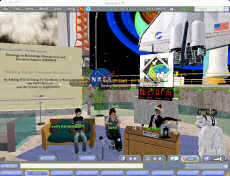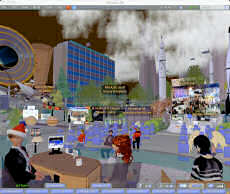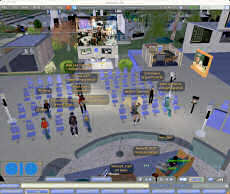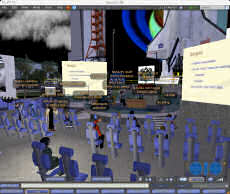NASA-Ontolog-KMWG OKMDS mini-series Session-02 - Thu 13-Dec-2007 (15Z7)
- Subject: Ontology in Knowledge Management and Decision Support (OKMDS): Making Better Decisions (15Z8)
- Panel Session Title: Making Better Strategic Decisions, by Asking If It Is Going To Get Better or Worse - the SOFI Method and the System to Implement it (15SF)
- Session chair: Ms. Jeanne Holm (NASA/JPL) (16EL)
- Panelists / Contributors: Mr. Peter Yim (CIM3 / Ontolog), Mr. Theodore Gordon (Millennium Project, WFUNA), Mr. Adam Cheyer (SRI), Professor Kenneth Baclawski (Northeastern University), Dr. Patrick Cassidy (MICRA), Mr. Duane Nickull (Adobe), Dr. Denise Bedford (WorldBank) and Dr. Jerome Glenn (Millennium Project, WFUNA) (15TM)
- Archive: slides & audio recording of the session (mp3) (16EM)
- Location in Second Life: Explorer Island - http://slurl.com/secondlife/Explorer%20Island/198/208/22 (16NM)
 .
.  .
.  .
.  (16NN)
(16NN)
From the virtual world event: screenshot-01 screenshot-02 screenshot-03 screenshot-04 (click on above links to view the full size images) . . . . . . Source: courtesy JeanneHolm NASA/JPL (16NO)
Conference Call Details (16EN)
- Date: Thursday, December 13, 2007 (16EO)
- Start Time: 10:30am PST / 1:30pm EST / 18:30 UTC (16EP)
- ref: World Clock (16EQ)
- Expected Call Duration: ~2.0 hours (16ER)
- Dial-in Number: (16ES)
- Direct call from from Skype: +990008275823120 (16ET)
- When calling in from a phone, use Conference ID: "5823120#" (16EU)
- from a US telephone (US): +1-605-475-8590 (South Dakota, USA) (16EV)
- from Europe, call: (16EW)
- callers from other countries please dial into either one of the US or European numbers (16F4)
- Location in Second Life: Explorer Island - http://slurl.com/secondlife/Explorer%20Island/198/208/22 (16F5)
- Shared-screen support (VNC session) will be started 5 minutes before the call at: http://vnc2.cim3.net:5800/ (16F6)
- view-only password: "ontolog" (16F7)
- if you plan to be logging into this shared-screen option (which the speaker may be navigating), and you are not familiar with the process, please try to call in 5 minutes before the start of the session so that we can work out the connection logistics. Help on this will generally not be available once the presentation starts. (16F8)
- people behind corporate firewalls may have difficulty accessing this. If that is the case, please download the slides below and running them locally. The speaker(s) will prompt you to advance the slides during the talk. (16F9)
- Please review our Virtual Session Tips and Ground Rules - see: VirtualSpeakerSessionTips (16FA)
- see below regarding our in-session Q & A process (16FB)
- RSVP to peter.yim@cim3.com appreciated. (16FC)
- This session, like all other Ontolog events, is open to the public. Information relating to this session is shared on this wiki page: http://ontolog.cim3.net/cgi-bin/wiki.pl?ConferenceCall_2007_12_13 (16FD)
- Please note that this session will be recorded, and the audio archive is expected to be made available as open content to our community membership and the public at-large under our prevailing open IPR policy. (16FE)
Attendees (16FF)
- Registered Particpants & Attendees: (16FH)
- JeanneHolm [SL: Devery Barrymore] (16FG)
- CharleyWhite [SL: Jet Burns] (16JL)
- PeterYim [SL: Pete Itano] (16FJ)
- TedGordon (in absentia) (16FK)
- AdamCheyer (16FL)
- KenBaclawski (16FM)
- PatCassidy (16FN)
- DeniseBedford (16FO)
- JerryGlenn (16FP)
- ZhanjunLi (16IB)
- Ravi Sharma (Vangent) (16IC)
- JackPark (16ID)
- RexBrooks (16IE)
- Jack Ring (Kennen Technologies) (16IF)
- Kiavash Bahreini (Eastern Mediterranean University, TRNC) (16IG)
- Bruce Altner (NASA HQ) (16IH)
- Harriet Riofrio (16IJ)
- MitchRinger (16IK)
- Paul Villano (Army) (16IL)
- JohnYanosy (NCOIC / Rockwell Collins) (16IM)
- Richard Adler (Decision Path) (16IN)
- John Lumpkin (NIH/NIAID; Lockheed Martin) (16IO)
- Paige Lucas-Stannard (NASA) (16J0)
- Annette Tingle (NASA, SAIC) (16J1)
- SusanTurnbull (16J2)
- Elizabeth Florescu (MP/WFUNA) (16J3)
- MarkFeblowitz (16J4)
- AmandaVizedom (16J5)
- Ann Houston (Grammarsmith) (16J6)
- BruceBray (16J7)
- Danny Thornton (IT Consultant) (16JH)
- KarlHebenstreit (16JM)
- BrandKNiemann (16JZ)
- RenateRoskeShelton (16K0)
- Tim Mack (WFS) (16K1)
- Shon Vick (Johns Hopkins U / Applied Physics Lab) (16K2)
- DougHolmes (16NC)
- BrandNiemann (16NH)
- Kevin Hannon (InfoCurators) (16NI)
- (16FQ)
- ... to register for participation, please add your name (plus your affiliation, if you aren't already a member of the community) above, or e-mail <peter.yim@cim3.com> so that we can reserve enough resources to support everyone's participation. ... (16FR)
- Regrets: (16FS)
Background (16FT)
This "Ontology in Knowledge Management and Decision Support (OKMDS)" mini-series is a collaboration between NASA, Ontolog and the (US) Federal Knowledge Management Working Group (KMWG) and is co-organized by a team of individuals from various related communities passionate about creating the opportunity for an inter-community, collaborative exploration of the intersection between Ontology, Knowledge Management and Decision Support, that could eventually lead us toward "Better Decision Making." (16FU)
The mini-series will span a period of about six months (Nov-2007 to May-2008), during which we will be featuring Talks, Panel Discussions and Online Discourse on pertinent issues. We expect all the talks and panel discussion events to be offered in both 'real world' (augmented conference calls) and 'virtual world' (Second Life) settings. (16FV)
Refer to details about this mini-series at the OKMDS project homepage at: http://ontolog.cim3.net/cgi-bin/wiki.pl?OKMDS (16FW)
Agenda & Proceedings: OKMDS mini-series Session-02 (16FX)
- Session Format: this is a virtual session conducted over an augmented conference call. This virtual event is also featured concurrently at the NASA/JPL Explorer Island in the "Second Life" virtual world settings. (16FY)
- Agenda: (16FZ)
- 1. Opening by the Session chair - JeanneHolm (16G0)
- 2. we'll go around with a self-introduction of participants (15~20 minutes) - All - we'll skip this if we have more than 25 participants (in which case, it will be best if members try to update their namesake pages on this wiki prior to the call so that everyone can get to know who's who more easily.) (16G1)
- 3. Main Presentation (~60 min.) - PeterYim, JerryGlenn, TedGordon, AdamCheyer, KenBaclawski, PatCassidy & DeniseBedford (16G2)
- 5. Q & A and Open discussion by all participants (~30 minutes) - All (16G3)
- 6. Summary / Conclusion / Follow-up / Next Event Announcement by the Session Chair - JeanneHolm (16G4)
Title: Making Better Strategic Decisions, by Asking If It Is Going To Get Better or Worse - the SOFI Method and the System to Implement it (16G5)
Abstract: (15SG)
Simply ask "If It Is Going To Get Better or Worse", and then just go with the decision that would get things better for us! This almost seems intuitively obvious ... until we delve seriously into the issue, and start wondering: (15SH)
- what are the pertinent factors that would affect whether it is going to get better or worse? (15SN)
- are these factors independent of one another? (15SO)
- how far back should we look? how far out should we project? (15SQ)
- "better or worse" for whom, anyway? (15Z6)
- how can we even reach these people? (15SS)
- who should we ask? ... the experts? or ask as many people as we can? (15SR)
- do we have data? enough? ... how much is enough anyway? (15SP)
- how about "too much data" into too many formats - how can we handle these massive amount of data? ... numeric, linguistic, multimedia, structured, unstructured, ... (15ST)
- are the inputs or answers binary? deterministic? stochastic? (15SU)
- ... the list of questions go on and on. (15SI)
Invited to join us will be a panel made up of some of the designers, researchers, implementers and advisors of the "State of the Future Index (SOFI)" methodology and system from the Millennium Project* team, which started working on this project since year 2000. (15SJ)
The SOFI team is on track to cast their R & D and Futures Research work into a collaborative open knowledge system. They are bringing to bear the people, the process and the technology to that job. They intend to harness some of the best legacies passed on to us, as well as state-of-the-art approaches in information management and technology, knowledge management, quantitative analysis, qualitative analysis, service oriented architecture, web 2.0, Delphi, RTDelphi, as well as semantic technologies. The use of ontologies and ontological engineering will be central to their approach in the next phase of the work, that will enable their tapping into virtual communities and disparate systems to come up with the collective intelligence to provide strategic decision support. (15SK)
Come find out what they have done and how they plan to take this forward. Let us share what the team has learned so far, and discuss how some of that learning can be applied elsewhere. (15SL)
About the Panelists & Contributors: (16G6)
Mr. PeterYim is the project director for the State of the Future Index ("SOFI") System project. He is the CEO of CIM Engineering, Inc. (dba. "CIM3") and a co-convener of Ontolog. (16G7)
Mr. TedGordon is a co-founder and Sr. Research Fellow of the Millennium Project, a world renowned futures researcher, one of the original pioneers of the Delphi Method, and the creator of the SOFI and RTDelphi Methods. He is a graduate engineer a specialist in planning and policy analysis, an inventor and an entrepreneur. He is also former chief engineer for the (NASA) Saturn program at McDonnell Douglas. (16G8)
Mr. AdamCheyer is an advisor to the SOFI System project, and a member of the implementation team for the Phase-1 SOFI System project. He is currently Program Director at the SRI Artificial Intelligence Center, where he serves as Chief Architect of the CALO/PAL project, an ambitious effort to create a next-generation personal cognitive assistant that learns and self-improves, by integrating state-of-the-art AI technologies from 22 research institutions, universities, and commercial companies. (16G9)
Professor KenBaclawski (Northeastern University) is a Mathematician and a researcher in High-Performance Ontology-Based Computing. He joins the SOFI team to introduce Bayesian Network techniques and other ontology-driven approaches to the SOFI algorithm and system. (16GA)
Dr. PatCassidy is an advocate for upper ontology standardization. He chairs the SICoP ONTACWG and leads the COSMO effort. He joins the SOFI team to develop a Conceptual Defining Vocabulary (CDV) which can then be used, as a foundation ontology, by the broad spectrum of domain experts to represent knowledge in their respective domain. (16GB)
Mr. DuaneNickull is an advisor to the SOFI System project, and a member of the architectural and design team for the next phase of the SOFI System project. He has headed numerous Standardization efforts and has been, among others, Vice Chair of the United Nations Centre for Facilitation of Commerce and Trade (UN/CEFACT) where he oversees the United Nations Electronic Business strategy and architecture, and Chair of the Technical Committee for the OASIS Service Oriented Architecture (SOA) Reference Model. Mr. Nickull is a Senior Strategy Analyst for Adobe Systems. (16IS)
Dr. DeniseBedford is currently Senior Information Officer at the WorldBank as well as adjunct professor at the Catholic University and Georgetown University. She is a member of the SOFI Advisory Committee, and sits on this panel to provide an outside-in perspective, both from the vantage points of (a) the WorldBank's database being a key data source for SOFI, and (b) research analysts and policy makers from institutions like the WorldBank, are be among key targeted users of SOFI and the SOFI System. (16GC)
Dr. JerryGlenn is an internationally acclaimed futurist, advisor and speaker on the global situation and prospects for the future. He co-founded and directs the Millennium Project, a leading global participatory think tank supported by international organizations, governments, corporations, and NGOs; with some 2000 participants located in 26 nodes spread throughout the world. (16HU)
Resources (16GD)
- Our panel's prepared slides can be accessed by pointing your web browsers to: (16GE)
- additional resources: (16GG)
- The SOFI and SOFI System initiatives are a part of the activities of the Millennium Project, a global, trans-institutional think tank that functions under the auspices of the World Federation of United Nations Associations (WFUNA) (16GH)
- Reference: Futures Research Methodology version 2.0 by the Millennium Project, especially: (16GI)
- Chapter 22 - SOFI Methodology, and (15SW)
- Chapter 23 - SOFI System (15SM)
- To participate in the online discourse to further explore the OKMDS subject matter, please subscribe to our open archived discussion forum by: (16GJ)
- sending a blank e-mail to okmds-convene-join@ontolog.cim3.net (16GK)
- To be part of the conversation, it is most appropriate that you should already be a member of either the KMWG community or the Ontolog community. Read on, if you aren't already. (16GL)
- For participation in KMWG (US) Federal Knowledge Management Working Group - an open forum for collaboration on issues related to government-focused knowledge management, (16GM)
- join their [KMgov] distribution list by sending a blank e-mail to: kmgov-subscribe@list.jpl.nasa.gov (16GN)
- For participation in Ontolog - an open, international, virtual community of practice devoted to advancing the field of ontology, ontological engineering and semantic technology, and advocating their adoption into mainstream applications and international standards, (16GO)
- please refer to Ontolog membership information details at: http://ontolog.cim3.net/cgi-bin/wiki.pl?WikiHomePage#nid1J (16GP)
- For participation in KMWG (US) Federal Knowledge Management Working Group - an open forum for collaboration on issues related to government-focused knowledge management, (16GM)
- To subscribe to [ontolog-invitation], the Ontolog event announcement list (one doesn't necessarily have to be a community member), simply send a blank e-mail to ontolog-invitation-join@ontolog.cim3.net, and then confirm to the system generated e-mail address validation message accordingly. (16GQ)
- Participant suggestions and resources: (16NT)
- SusanTurnbull: it would be nice if the foundational ontology could incorporate, in addition to ordinary (written or spoken) language primitives, to also include symbolic language primitives. Suggest the team look into Blissymbolics - (16NU)
- PatCassidy: it would be nice if SecondLife or other game/virtualworld vendors would share with us their internal software structures so that initiatives toward achieving semantic interoperability between existing application domains and 3D virtual domains can be made (16NW)
- PeterYim (after the session): looks like Linden Lab (developers of SecondLife) have open sourced their software - see: their announcement on 2007.01.08 and http://secondlifegrid.net/programs/open_source (16NX)
- DeniseBedford (DuaneNickull too) had suggested that we look into adopting the Statistical Data and Metadata Exchange (SDMX) standard (16NY)
- PeterYim also suggests our looking into adopting the Unstructured Information Management Architecture (UIMA) standard (16O0)
Questions, Answers & Discourse: (16GR)
- Please mute your phone, by pressing "*2" on your phone keypad, when the talk is in progress. To un-mute, press "*3" (16GS)
- If you want to speak or have questions or remarks to make, please "raise your hand (virtually)" by pressing "11" on your phone keypad. You may speak when acknowledged by the speaker or the session moderator. (16GT)
- You can also type in your questions or comments through the browser based queue management chat tool by: (16GU)
- point a separate browser tab (or window) to http://webconf.soaphub.org/conf/room and enter: Room="ontolog_20071213" and My Name="Your Own Name" (e.g. "JaneDoe") (16GV)
- or point your browser to: http://webconf.soaphub.org/conf/room/ontolog_20071213 (16GW)
- instructions: once you got access to the page, click on the "settings" button, and identify yourself (by modifying the Name field). You can indicate that you want to ask a question verbally by clicking on the "hand" button, and wait for the moderator to call on you; or, type and send your question into the chat window at the bottom of the screen. (16GX)
- For those who have further questions or remarks on the topic, please post them to the [okmds-convene] forum so that everyone in the community can benefit from the discourse. (One needs to be subscribed to this archived mailing list first before posting. See subscription details here.) (16GY)
Audio Recording of this Session (16GZ)
- To download the audio recording of the session, click here (16H2)
- the playback of the audio files require the proper setup, and an MP3 compatible player on your computer. (16H3)
- Conference Date and Time: 13-Dec-2007 10:44am~12:43pm Pacific Standard Time (16H4)
- Duration of Recording: 1 Hour 53 Minutes (16H5)
- Recording File Size: 12.9 MB (in mp3 format) (16H6)
- Telephone Playback: (16H7)
- Prior to the Expiration Date of 13-Jan-2008 0:00 AM PST, one can call-in and hear the telephone playback of the session. (16H8)
- Playback Dial-in Number: (long distance costs apply) (16H9)
- US: +1-605-475-8599 (16HA)
- Belgium: +070 35 9990 (16HB)
- France: +0826 100 279 (16HC)
- Germany: +01805 00 7641 (16HD)
- Ireland: +0818 270 036 (16HE)
- Italy: +0848 390 177 (16HF)
- Switzerland: +0848 560 197 (16HG)
- UK: +0870 738 0768 (16HH)
- Skype: +990008271111 (free computer-to-computer call) (16HI)
- non-Skype callers from other countries can dial into either the US or UK number for the playback (long distance costs apply) (16HJ)
- Conference ID: 5823120# (16HK)
- Recording Reference Number: 134931# (16HL)
- suggestions: (16HM)
- its best that you listen to the session while having the slide presentation opened in front of you. You'll be prompted to advance slides by the speaker. (16HN)
- Take a look, also, at the rich body of knowledge that this community has built together, over the years, by going through the archives of noteworthy past Ontolog events. (16SF)